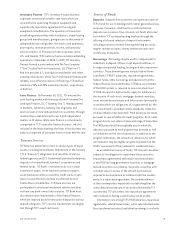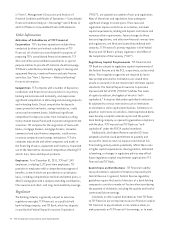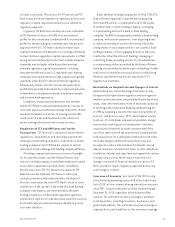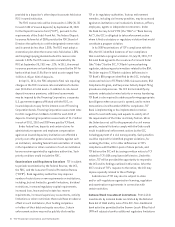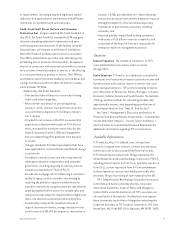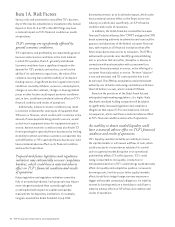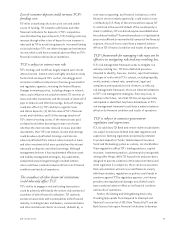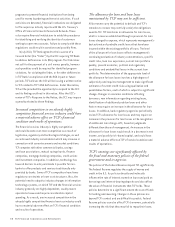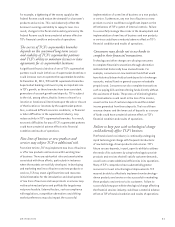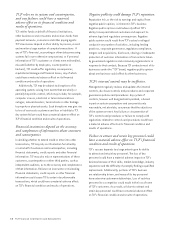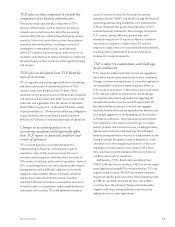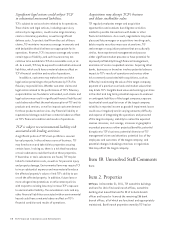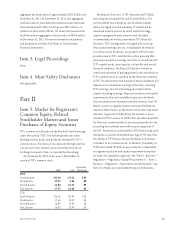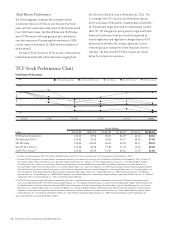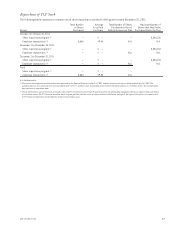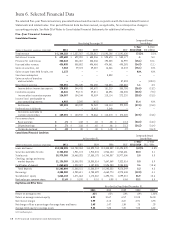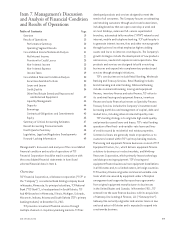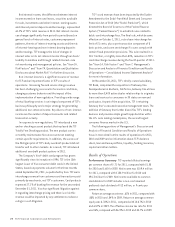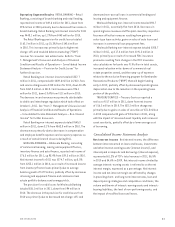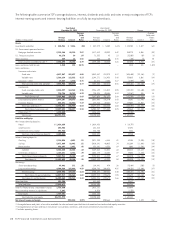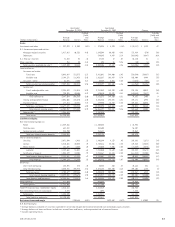TCF Bank 2011 Annual Report Download - page 31
Download and view the complete annual report
Please find page 31 of the 2011 TCF Bank annual report below. You can navigate through the pages in the report by either clicking on the pages listed below, or by using the keyword search tool below to find specific information within the annual report.TCF relies on other companies to provide key
components of its business infrastructure.
Third party vendors provide key components of TCF’s
business infrastructure, such as internet connections,
network access and transaction and other processing
services. While TCF has selected these third party vendors
carefully, it does not control their actions. Any problems
caused by these third parties, including as a result of
inadequate or interrupted service, could adversely
affect TCF’s ability to deliver products and services to its
customers and otherwise to conduct its business. Replacing
these third party vendors could also entail significant delay
and expense.
TCF relies on dividends from TCF Bank for
most of its revenue.
TCF is a separate and distinct legal entity from its banking
and other subsidiaries. A substantial portion of TCF’s
revenue comes from dividends from TCF Bank. These
dividends are the principal source of funds to pay dividends
and interest and principal on its debt. Various federal and
state laws and regulations limit the amount of dividends
that TCF Bank may pay to it. In the event TCF Bank is unable
to pay dividends to it, TCF may not be able to pay obligations
or pay dividends, which would have a material adverse
effect on TCF’s financial condition and results of operations.
Changes in accounting policies or in
accounting standards could materially affect
how TCF reports its financial condition and
results of operation.
TCF’s accounting policies are fundamental to the
understanding its financial condition and results of
operations. Some of these policies require the use of
estimates and assumptions that may affect the value of
TCF’s assets or liabilities and results of operations. Some of
TCF’s accounting policies are critical because they require
management to make difficult, subjective and complex
judgments about matters that are inherently uncertain
and because materially different amounts would be
reported if different estimates or assumptions were used.
If such estimates or assumptions underlying the financial
statements are incorrect, TCF could experience material
losses. From time to time, the Financial Accounting
Standards Board (“FASB”) and the SEC change the financial
accounting and reporting standards or the interpretation
of those standards that govern the preparation of TCF’s
external financial statements. These changes are beyond
TCF’s control, can be difficult to predict and could
materially impact how TCF reports its financial condition
and results of operations. Additionally, TCF could be
required to apply a new or revised standard retrospectively,
resulting in the restatement of prior period financial
statements in material amounts.
TCF is subject to examinations and challenges
by tax authorities.
TCF is subject to federal and state income tax regulations,
which often require interpretation due to their complexity.
Changes in income tax regulations or in how the regulations
are interpreted could have a material adverse effect on
TCF’s results of operations. In the normal course of business,
TCF is routinely subject to examinations and challenges
from federal and state taxing authorities regarding the
amount of taxes due in connection with investments TCF
has made and the businesses in which it has engaged.
Recently, federal and state taxing authorities have become
increasingly aggressive in challenging tax positions taken
by financial institutions. These tax positions may relate to
tax compliance, sales and use, franchise, gross receipts,
payroll, property and income tax issues, including tax base,
apportionment and tax credit planning. The challenges
made by taxing authorities may result in adjustments to the
timing or amount of taxable income or deductions, or the
allocation of income among tax jurisdictions. If any such
challenges are made and are not resolved in TCF’s favor,
they could have a material adverse effect on its financial
condition and results of operations.
Additionally, if TCF’s Real Estate Investment Trust
(“REIT”) affiliate fails to qualify as a REIT, or should states
enact legislation taxing REITs or related entities, TCF’s tax
expense would increase. The REIT and related companies
must meet specific provisions of the Internal Revenue Code
of 1986, as amended, and state tax laws. Use of REITs
is and has been the subject of federal and state audits,
litigation with state taxing authorities and tax policy
debates by various state legislatures.
132011 Form 10-K


